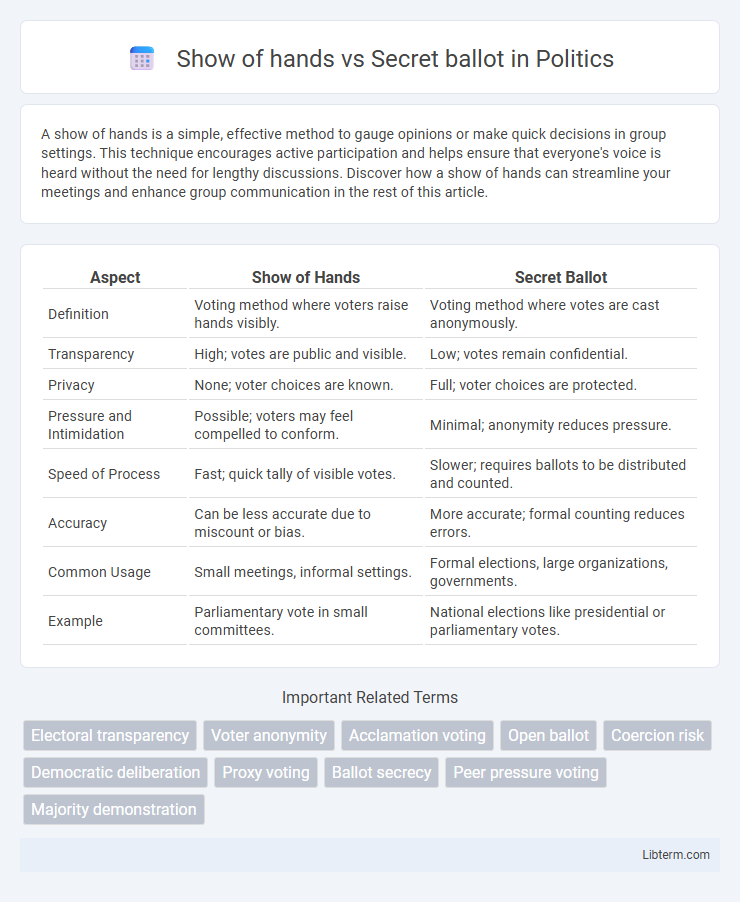A show of hands is a simple, effective method to gauge opinions or make quick decisions in group settings. This technique encourages active participation and helps ensure that everyone's voice is heard without the need for lengthy discussions. Discover how a show of hands can streamline your meetings and enhance group communication in the rest of this article.
Table of Comparison
| Aspect | Show of Hands | Secret Ballot |
|---|---|---|
| Definition | Voting method where voters raise hands visibly. | Voting method where votes are cast anonymously. |
| Transparency | High; votes are public and visible. | Low; votes remain confidential. |
| Privacy | None; voter choices are known. | Full; voter choices are protected. |
| Pressure and Intimidation | Possible; voters may feel compelled to conform. | Minimal; anonymity reduces pressure. |
| Speed of Process | Fast; quick tally of visible votes. | Slower; requires ballots to be distributed and counted. |
| Accuracy | Can be less accurate due to miscount or bias. | More accurate; formal counting reduces errors. |
| Common Usage | Small meetings, informal settings. | Formal elections, large organizations, governments. |
| Example | Parliamentary vote in small committees. | National elections like presidential or parliamentary votes. |
Introduction to Voting Methods
Show of hands is a straightforward voting method where participants raise their hands to indicate their choice, allowing for quick and transparent decision-making in small groups or meetings. Secret ballot ensures voter anonymity by allowing individuals to cast votes privately, enhancing confidentiality and reducing the risk of coercion or influence. Both methods serve distinct purposes in democratic processes, with show of hands favoring immediacy and secrecy favoring privacy and fairness.
Definition of Show of Hands
A Show of Hands is a voting method where participants raise their hands to express their choices openly, allowing immediate visual counting. This approach contrasts with a Secret Ballot, which ensures voter anonymity to protect privacy and reduce potential bias. The Show of Hands is often used for quick, informal decisions in meetings or small assemblies.
Definition of Secret Ballot
A secret ballot is a voting method that ensures individual choices remain confidential, preventing voter intimidation and maintaining election integrity. This system typically involves voters marking their preferences privately on a ballot paper or electronic device, thereby protecting anonymity. Unlike a show of hands, where votes are visible, the secret ballot promotes unbiased results and safeguards democratic principles.
Historical Background of Each Method
Show of hands voting traces back to ancient democratic assemblies, notably in Ancient Greece where public voting symbolized transparency and communal decision-making. Secret ballot emerged in the 19th century, with the Australian ballot system in 1856 pioneering private voting to reduce coercion and protect voter privacy. The transition marked a significant shift toward safeguarding electoral integrity and individual freedom in increasingly complex democracies.
Transparency vs. Privacy in Voting
A show of hands promotes transparency by allowing votes to be visibly counted and verified in real-time, fostering open accountability in decision-making processes. However, it compromises voter privacy, potentially influencing individuals' choices due to peer pressure or fear of retaliation. In contrast, secret ballots safeguard voter anonymity, ensuring privacy and reducing the risk of coercion while limiting immediate transparency in vote tallying.
Advantages of Show of Hands
Show of hands offers immediate visual clarity and speeds up the voting process by allowing participants to quickly express their opinions without the need for paper ballots or counting. This method promotes transparency and encourages active participation as voters are visibly accountable for their choices. It also reduces administrative overhead and costs associated with organizing and managing secret ballots.
Advantages of Secret Ballot
The secret ballot ensures voter privacy, which significantly reduces the risk of coercion and intimidation, promoting genuine expression of individual choice. It eliminates social pressure and potential retaliation by keeping votes confidential, leading to more honest and accurate election outcomes. Secret ballots also enhance fairness and trust in the electoral process by protecting voters from external influence and ensuring equal weight for each vote.
Common Scenarios and Use Cases
Show of hands is typically used in informal or small-group settings where immediate, transparent decision-making is needed, such as community meetings or classroom voting. Secret ballots are preferred in formal elections or sensitive situations requiring voter privacy and minimizing influence, like political party leadership contests or workplace union votes. The choice depends on the need for transparency versus confidentiality and the context's scale and potential for peer pressure.
Challenges and Criticisms
Show of hands often faces challenges related to peer pressure and lack of voter anonymity, which can lead to biased or influenced voting outcomes. Secret ballots address these concerns but face criticisms regarding logistical complexities and the potential for ballot tampering or fraud. Both methods struggle with ensuring transparency while maintaining the integrity and confidentiality of the voting process.
Choosing the Right Voting Method
Choosing the right voting method depends on factors such as privacy needs, vote accuracy, and group size. Show of hands offers transparency and speed, ideal for small, informal meetings where peer pressure is minimal. Secret ballots guarantee voter anonymity, ensuring unbiased results in sensitive decisions or larger groups where confidentiality is crucial.
Show of hands Infographic

 libterm.com
libterm.com